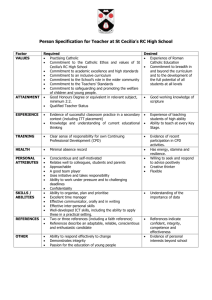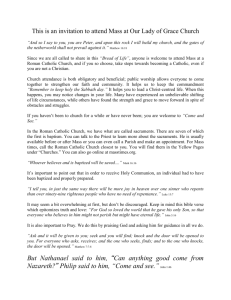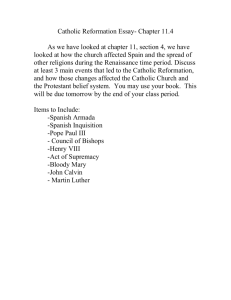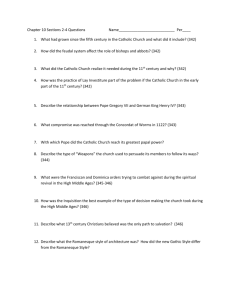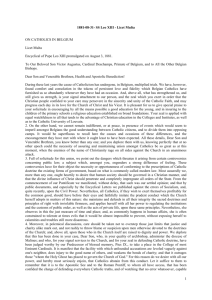Marketing Concepts - Wolfgang Grassl
advertisement
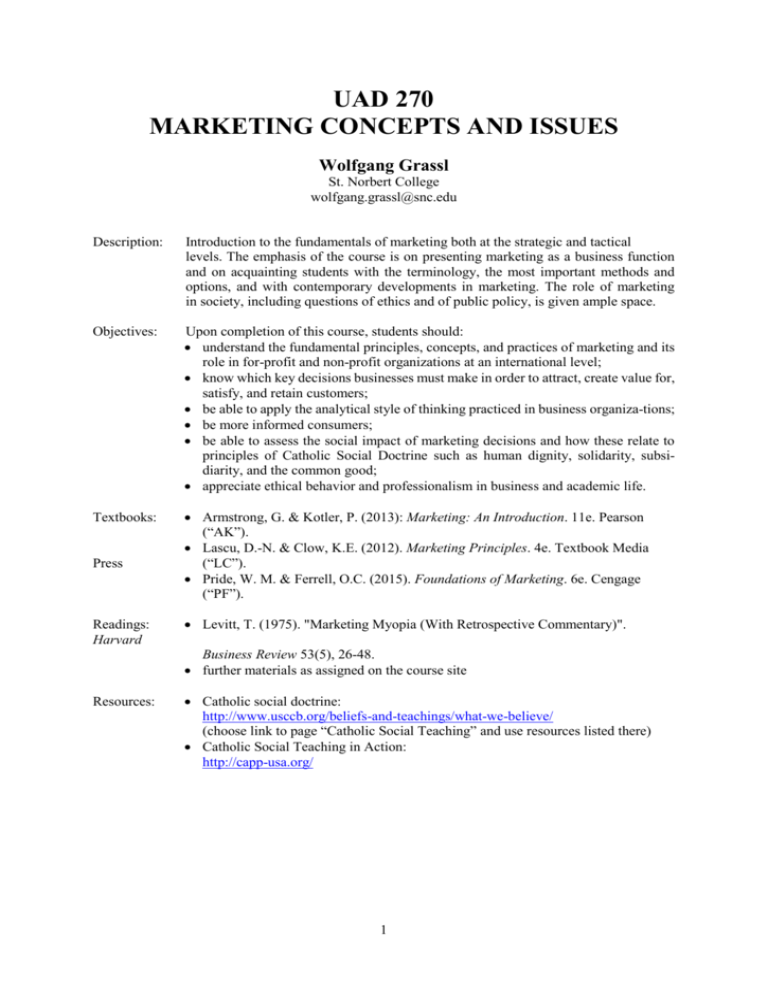
UAD 270 MARKETING CONCEPTS AND ISSUES Wolfgang Grassl St. Norbert College wolfgang.grassl@snc.edu Description: Introduction to the fundamentals of marketing both at the strategic and tactical levels. The emphasis of the course is on presenting marketing as a business function and on acquainting students with the terminology, the most important methods and options, and with contemporary developments in marketing. The role of marketing in society, including questions of ethics and of public policy, is given ample space. Objectives: Upon completion of this course, students should: understand the fundamental principles, concepts, and practices of marketing and its role in for-profit and non-profit organizations at an international level; know which key decisions businesses must make in order to attract, create value for, satisfy, and retain customers; be able to apply the analytical style of thinking practiced in business organiza-tions; be more informed consumers; be able to assess the social impact of marketing decisions and how these relate to principles of Catholic Social Doctrine such as human dignity, solidarity, subsidiarity, and the common good; appreciate ethical behavior and professionalism in business and academic life. Textbooks: Armstrong, G. & Kotler, P. (2013): Marketing: An Introduction. 11e. Pearson (“AK”). Lascu, D.-N. & Clow, K.E. (2012). Marketing Principles. 4e. Textbook Media (“LC”). Pride, W. M. Ferrell, O.C. (2015). Foundations of Marketing. 6e. Cengage (“PF”). Press Readings: Harvard Levitt, T. (1975). "Marketing Myopia (With Retrospective Commentary)". Business Review 53(5), 26-48. further materials as assigned on the course site Resources: Catholic social doctrine: http://www.usccb.org/beliefs-and-teachings/what-we-believe/ (choose link to page “Catholic Social Teaching” and use resources listed there) Catholic Social Teaching in Action: http://capp-usa.org/ 1 Topic Issues 1 Student Tasks and Resources Marketing and Customer Value Introduction to the course Marketing as a business function Marketing concept Relationship marketing Textbook s AK, Ch. 1 LC, Ch. 1 PF, Ch. 1 Discussion of Levitt 1975 Discussion: When are relationships true? 2 The Catholic View on Marketing Principles of Catholic social doctrine Catholic understanding of business Ethical issues of marketing Diagram of Catholic Social Doctrine “Key Principles of Catholic Social Teaching” ◊ Assignment 1: Marketing ethics AK, Ch. 16 LC, Ch. 3 PF, Ch. 3 3 The Marketing Environment Microenvironment Macroenvironment The missing link: The spiritual environment * Discussion: How is meaning being marketed? Corporate and Marketing Strategy Corporate strategic planning Business portfolio Marketing strategy and marketing mix “Creating Customer Value” Creation of customer value: V = B/C AK, Ch. 3 LC, Ch. 2 PF, Ch. 3 4 5 Managing Marketing Information Marketing information systems Levels of marketing research Methods of marketing research 6 Understanding Consumer Behavior Needs vs wants: consumption choices Model of consumer behavior Buyer decision process Problems of consumerism Adoption of new products 7 Understanding Business Buyer Behavior Importance of business markets Business purchase decision making 8 Market Segmentation and Targeting Why market segmentation? Segmentation bases Targeting strategies 9 Positioning and Competitive Advantage Positioning on what? Porter’s theory of competitive advantage Working with positioning maps 10 Products and Brands Product classification Product management decisions Brands and branding 11 Services AK, Ch. 2 LC, Ch. 8 PF, Ch. 2 AK, Ch. 4 LC, Ch. 7 PF, Ch. 4 Consumer Behavior Teaching Note http://cappusa.org/contemporary_issues/19; Centesimus Annus, 36 AK, Ch. 5 LC, Ch. 4 PF, Ch. 6 AK, Ch. 5 LC, Ch. 5 PF, Ch. 7 AK, Ch. 6 LC, Ch. 6 PF, Ch. 5 ◊ Assignment 2: Marketing strategy AK, Ch. 6 * Discussion: Marketing as influenc- LC, Ch. 6 ing consumers’ minds – an attractive PF, Ch. 5 view? Products & Brands Teaching Notes *Discussion: When are products really good? AK, Ch. 7 LC, Ch. 8 PF, Ch. 10 AK, Ch. 7 2 Classical definition of services Is this understanding still appropriate? Issues of service quality 12 New Product Development and the Life Cycle New Product Development Product diffusion and Product Life Cycle Managing the product portfolio 13 Pricing Influences on pricing Pricing strategies Pricing management What is a just price? 14 Distribution: Marketing Channels Channel functions Channel management Discussion: What does it mean to serve others? LC, Ch. 9 PF, Ch. 11 AK, Ch. 8 LC, Ch. 8 PF, Ch. 11 ◊ Assignment 3: Marketing mix Aquinas, ST II-II, q.77, a.1&4 15 Distribution: Logistics and the Supply Chain Logistics functions and management Supply chains 16 Distribution: Retailing and Wholesaling Retail formats Retail management and trends Wholesale functions * Discussion: Is disintermediation fair? 17 Integrated Marketing Communication IMC process IMC mix Communication effectiveness 18 Advertising and Public Relations Impact, types, objectives Creative design Media decisions Functions and tools of public relations 19 Sales Promotion and Personal Selling Tools of consumer and trade promotions Personal Selling * Discussion: When is advertising really good? 20 Direct and Online Marketing Tools of direct marketing Benefits and functions of online marketing Guest speaker on social media marketing E-commerce 21 International Marketing Internationalization drivers Market entry modes 3 AK, Ch. 9 LC, Ch. 12 PF, Ch. 12 AK, Ch. 10 LC, Ch. 10 PF, Ch. 13 AK, Ch. 10 LC, Ch. 10 PF, Ch. 13 AK, Ch. 11 LC, Ch. 11 PF, Ch. 14 AK, Ch. 12 LC, Ch. 13 PF, Ch. 15 AK, Ch. 12 LC, Ch. 14 PF, Ch. 16 AK, Ch. 13 LC, Ch.15f. PF, Ch. 17 AK, Ch. 14 LC, Ch. 18 PF, Ch. 9 AK, Ch. 15 International marketing strategy International marketing mix 22 Responsible and Sustainable Marketing Why corporate social responsibility? Is product quality an ethical imperative? Is planned obsolescence unjustified? Why sustainable marketing? Aquinas, ST II-II, q.77, a.2&3 LC, Ch. 18 PF, Ch. 8 AK, Ch. 16 Centesimus Annus, 37; Caritas in Veritate, 21, 40, 48-51 Note: Most resources produced by the author, together with links to websites and other resources, are not part of this Teaching Guide. 4


